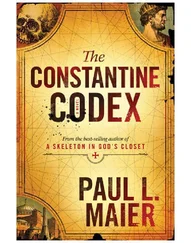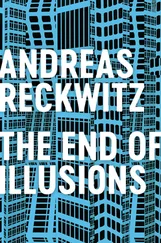My existence back then was eternal, and every day was eternal too, because everything was already established. A question like “Why is there an entire bathroom in the cellar, with a shower, bath, and toilet?” would never have even entered my mind. In fact, the first time the bathroom provoked any kind of surprise in me was when I went back down to the cellar for the first time in over twenty years. The way it looked! It was a relatively bright, completely tiled basement room with a drain in the middle of the floor, a little window at head height, and no decoration or embellishment of any kind — it immediately made me think of a Gestapo cellar, or at least of something in an Aki Kauriskmäki film. When I was a child of three or four years of age, neither Gestapo cellars nor Aki Kauriskmäki films existed; there was just this total, unchangeable, irrevocable world in which everything was fixed apart from me, for I was able to move through it as I wished (or rather how I was supposed to), and even though this world only really consisted of two houses — my parent’s house and the house in Uhlandstrasse, which I myself would move into much later, in 1999, once everyone was dead — it was still the most universal world imaginable. And I barely expanded this world as my life went on, only adding the Wetterau as a concept, and that’s how it remained, from my uncle’s room over the cellar and everything else, to the Wetterau, my home. All the other towns and cities I’ve lived in, even Rome, are now part of the world which is the Wetterau.
To my way of thinking, my uncle wasn’t into boys; otherwise I’m sure he would have done something with me in the cellar. But then again, much like a child himself, maybe he was just too in awe of his mother, the mother who unquestioningly looked after — or tolerated — him well into her old age. Maybe it was this deep sense of awe for her that made him hold back from everything. But at some point he must have realised that sowing his wild oats with women would at least have been more normal than doing it with anyone else (or in other words, more socially acceptable and thus not subject to shame and punishment). Maybe that’s how women ended up becoming the focus of his attention, even though actually imagining it still baffles all of us. Is that why his bedroom door was always locked? I mean ‘locked’ in a metaphorical sense; maybe he never locked the door and instead relied on the fact that someone like me would never set foot in his hellhole, even if the door wasn’t locked. He probably had an unspoken agreement with Grandmother, his mother, that she wouldn’t snoop around in there, so that she wouldn’t risk finding what she didn’t want to find or knowing what she didn’t want to know. All I know is that the cleaning ladies had difficulties with him (that’s another one of those words: difficulties ); he would approach them from behind while they were bending over, they said, always from behind, and even Aunt Lenchen had encounters of this kind with him, despite being ten years older and over seventy by the end. Even in later years, he would go up behind her and grab her around the bosom, following his inner nature as defined by God, even though it didn’t fit the context of either his life or Aunt Lenchen’s — they weren’t in the wild, after all. And that’s why, of course, there was an uproar whenever J complied with his inner nature and grabbed Aunt Lenchen around the bosom from behind, as if it belonged to him and he had the right to do so.
I never set foot in J’s bedroom. I doubt Aunt Lenchen ever did either. I presume that even J’s mother rarely set foot in there and only in genuine emergencies, perhaps because not even she was protected by the aforementioned awe that he held for her. He wouldn’t let anything touch his mother, but that wouldn’t necessarily have stopped him from touching her breasts. And so for her it was like having this billy goat as a son, still living under the same roof even though he was getting on in years himself, a billy goat who, although only on occasion, would jump around and onto people. His room was a kind of primal dark room in my consciousness. Even though I spent a lot of time in my grandmother’s house as a child, especially after the death of my great-grandmother Else, who took care of me in the first few years of my life, I can’t picture J’s room at all. I don’t know where the bed was, though there must have been one, and I don’t have a clue what else could have been in there. I simply can’t picture it. Venturing in there during the years of the stench would have been hell. I would have died of disgust. But I wasn’t scared of the room: given that setting foot in there was completely inconceivable, its existence, so to speak, fell completely under the threshold of my perception. It was there, and yet at the same time it wasn’t. Since J spent most of his time sleeping, it must have almost always been pitch black in there. Today, it’s my study. I’ve always written novels in there, but until now it had never occurred to me to write about my mentally-impaired-at-birth uncle J. About him and his room. About the house and the street. And about my family. And our gravestones. And the Wetterau, which is the whole world. The Wetterau, which for most people is named after an Autobahn service station, the A5 Wetterau service station, which is now being transformed into a bypass. When it comes to down to it, the Wetterau is a bypass with a service station attached. When I say that, people laugh. And yet it was once my home. My home, a road. And now I’m writing a bypass while they bulldoze my home into oblivion outside, and I’m starting with my uncle in his room. This is the beginning that everything else stems from. The room, the house, the place, the street, the towns, my life, the family, the Wetterau and everything else beyond it. My uncle, the only human being without guilt I have ever known. On his way into the real world, but with one foot still in paradise.
It wasn’t obvious straight away that my uncle had a disability (he had been delivered by forceps). He could speak without any difficulty, for example. Admittedly only in simple sentences, but then that could be said of everyone in the Wetterau. There were certain topics which always prompted him to speak up. J was constantly telling stories about the forest, about Forsthaus Winterstein, the gamekeeper’s lodge, and about the hunters. He could list all the deer antlers hanging on the walls in Jagdhaus Ossenheim, the hunting lodge. He knew his stuff, how stags were called according to the number of points on their antlers. J always wore a camouflage hunting parka too. Another thing he used to talk very enthusiastically about was the radio. Whenever something was being broadcast from a big city in Europe, he would stand there in front of the old box radio (a Telefunken), twiddle the tuning knob and pretend to be some technical pioneer, because my uncle remained a child throughout his whole life and was wildly enthusiastic about technical things — an enthusiasm which I held only at the very beginning of my life, and never to the same extent. At Christmas he would tune into Deutschlandfunk for the broadcast of the ringing of the bells of St. Stephen’s Dome in Vienna. Even as late as 1980, my uncle was standing in front of the radio listening to the bells of St. Stephen’s, like others had once stood in front of the television, over ten years before, for the moon landing. He would then call out in a reverent fashion, and as if we should all pay attention, The bells of St. Stephen’s Dome ! We all humoured him by listening, but only ever for a few seconds. My uncle also liked standing in front of building sites and watching the machines and the workers. He never struck up a conversation with them, even though he would have loved to do so, to talk shop, as if he knew his stuff. He’d often seen these kinds of conversations on the premises of the family business: two or three workers standing around together and communicating entirely in vocabulary that was specific to the work or the machines or some technical process. To belong in this way was his life’s longing. Apparently he had been allowed to do a few odd jobs there when he was a boy, or so I hear. Filing, I assume, or running errands. I’ve been told that my grandfather even let him deliver pay packets. And yet allegedly, although I’m not sure at what point in time this was, my grandfather also beat him with a leather belt. My grandfather Wilhelm, the artistic man with the leather belt. That was always the first thing people said about my grandfather Wilhelm: Such an artistic man! He, the last artistic person in our family (he played the piano and studied architecture) and then I came along; I was seen as artistic too. Yes, that’s how they imagine artistic people to be — individuals like me or my grandfather (whom I never knew). Maybe the leather belt is even part of that for them, part of being artistic. My uncle wasn’t artistic, even though he loved folk music programmes very much, particularly Heino. Heino was someone who made my uncle happy, almost as happy as the dear Lord makes others. J’s eyes would light up when he listened to Heino, and his face would relax. My uncle spent most of the time with an expression of resentment on his face; after all, most of the time he was in a bad mood or about to have one of the choleric episodes which we children were so fond of provoking, despite the fact that they never ended well for us. But when he was standing in front of building sites or listening to Heino or watching folk music programmes, of which there weren’t many at the time, he was spellbound, in another world, just like when he was walking through the forest in his little hunting jacket. He would walk in this spellbound, alert way through the forest, like I did later. Uncle J is the only other person in our family who was able to identify different birds, that’s something we have in common. Maybe he wanted to belong there too: not to the wild animals, but to those who hunted them and knew them and were allowed to shoot them, unlike him. He was never allowed to hunt. Maybe J went to the forest in order to have some peace and quiet, from himself and from the probably eternally unwashed contents of his trousers, because in later years, as I already mentioned, he never showered, and always quickly contaminated everything with his stench. Although when I think about it now, what I was always told can’t be right. J must have washed now and again, even in later years, but not when he came back from his job at the Frankfurt Hauptbahnhof, nor when he had slept in after his night shifts and came into the kitchen or living room, nor when he drove Oma to see us in Friedberg in his Nazi-brown VW. But he must have washed after that, before he went into the forest and then to the inn (or even when he just went straight to the inn).
Читать дальше











